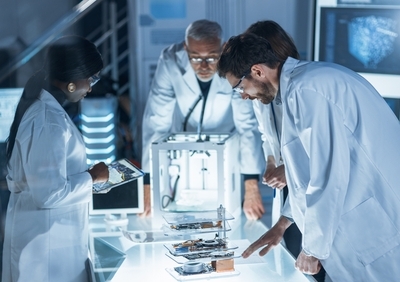UNSW receives $2.7m funding for research collaborations with industry
The latest announcement puts UNSW top in state for 2019 Australian Research Council (ARC) Linkage Project funding scheme.
The latest announcement puts UNSW top in state for 2019 Australian Research Council (ARC) Linkage Project funding scheme.

Five UNSW Sydney projects have received over $2.7 million in the final round of 2019 ARC Linkage Project grants announced today.
These projects from UNSW Engineering and UNSW Science are some of the 77 to receive $35 million in funding announced by the Minister for Education, The Hon Dan Tehan.
The result positions UNSW top in state for 2019 ARC Linkage Project grants, with the University receiving almost half of the funding provided to NSW institutions. UNSW is second among all Australian universities, receiving $9.4 million for 21 projects during the year.
UNSW’s total funding for 2019 leverages more than $16 million in industry contributions.
UNSW Deputy Vice-Chancellor (Research) Professor Nicholas Fisk congratulated UNSW researchers on their success in partnering with business, industry and community organisations to deliver future-thinking solutions to big picture problems.
“Post COVID-19, schemes such as Linkage will be increasingly key to the nation’s R&D led economic recovery. This is a UNSW strength, having been among the top two in the Go8 now for six of the last seven years.”
UNSW’s five projects are:
Scientia Professor Kaarin Anstey, from UNSW Science, has received $682,000 to investigate how cognitive changes can impact older drivers' use of assistive technology in vehicles. The findings will inform older drivers, government policy makers and industry, and will assist in road safety.
Associate Professor Megan Lord, from UNSW Engineering, has received $600,000 for a project which aims to advance knowledge of the biochemical and biophysical structure of the endothelial glycocalyx.
Associate Professor Sophie Primig, from UNSW Science, has received $570,000 to design a manufacturing process for superalloy aero-engine parts. This will enhance aero-engine material performance, resulting in shorter flights over longer distances and safer, more fuel-efficient, air travel.
Professor Sami Kara, from UNSW Engineering, has received $459,000 to develop an automated disassembly process for End-of-Life (EOL) Electric Vehicle (EV) batteries. This will result in higher material recovery efficiency and a lower cost in recycling EOL EV batteries due to significantly reduced labour. It will substantially reduce the environmental footprint associated with EOL treatment of EV batteries.
Dr Stuart Clark, from UNSW Engineering, has received $440,000 to build a new workflow for improving oil and gas exploration by Australian companies. The software product will be applied to three industry cases in frontier basins located onshore and offshore Australia.